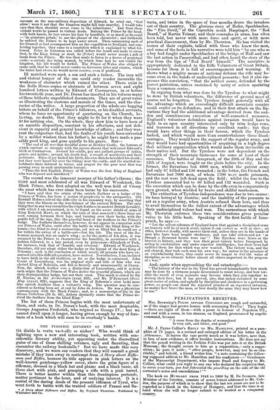THE TYROLESE RIFLEMEN OF 1809.* Ou diable la vertu va-t-elle
se nicher ? Who would think of lighting upon a new and interesting book, written with con- siderable literary ability, yet appearing under the discredited guise of one of those shilling volumes, ugly and flaunting, that encumber the railway bookstalls ? But we have made this very discovery, and we warn our readers that they will commit a great mistake if they turn away in contempt from A Story about Rifle- men and .Rfjles, because its title appears in pick letters on the well-known gambouge-yellow cover, above the grim figure of a rifleman, dressed in a black hat and plume and a black tunic, all three shot with pink, and grasping a rifle with a pink barrel. There is better matter within than this frontispiece portends, matter pertinent to the hour, and of undying interest. It is a recital of the daring deeds of the peasant riflemen of Tyrol, who went forth to battle with the trained soldiers of France and Ba- • A Story about Riflemen and Rifles. By Neyland Thornton. Published by Whittaker and Co.
varia, and twice in the space of four months drove the invaders out of their country. The glorious story of Hofer, Spechbacher, the "Fire Devil," of the Capuchin monk Haspinger, the "Red Beard," of Martin Teimar, and their comrades in arms, has often been told, but never with more force and spirit, or with more practical discernment, than by Mr. Thornton. He has visited the scenes of their exploits, talked with those who knew the men, and some of the facts in his narrative were told him " by one who as a boy had fought under Spechbacher at the bridge of Hall and saw the last action in Passeyrthal, and had often heard the story of the war from the lips of ' Red Beard' himself." The narrative is appropriately dedicated to the Rifle Volunteers of Great Britain, because for them it is full of encouragement and warning. It shows what a mighty means of national defence the rifle may be- come even in the hands of undisciplined peasants ; but it also im- presses this conviction, "that the noblest cause, defended by the purest patriotism, unless sustained by unity of action operating from a common centre.
In arguing from what was done by the Tyrolese to what might be done by British volunteers, the difference of ground must of• course not be forgotten. The Tyrolese fought generally with all the advantage which an exceedingly difficult mountain country could confer on its defenders, and in their first attack on the Ba- varians they had the additional advantage derived from the sud- den and simultaneous execution of well-concerted measures. England's volunteer defenders against invasion would have to fight in an open country intersected only by trim hedge rows, and traversed in all directions by excellent roads ; but they would have other things in their favour, which the Tyrolese lacked, and which would more than counterbalance these disad- vantages. They would have the support of the regular army, and they would have had opportunities of acquiring in a high degree that military organization which would make them invincible on their native soil. But the Tyrolese were not dependent on the strength of their mountain fastnesses for some at least of their successes. The battles of Innspruck, of the 29th of May and the 12th of August, were fought on the plain before the city. In the former, the Bavarians lost 4000 men, whilst the patriot army had only 87 killed and 156 wounded ; in the latter, the French and Bavarians lost 7000 men, of whom 1700 were made prisoners, and the rest were left dead upon the field ; whilst the loss to the Tyrolese amounted but to 50 killed and 132 wounded. Such is the execution which can be done by the rifle even in comparatively open ground, when wielded by brave and skilful marksmen.
The extinction of Tyrolese independence was due to two causes: its base betrayal by Austria; and the inability of the peasants to act as a regular army, when Austria refused them hers, and thus to avail themselves to the fullest extent of the advantages which their undisciplined valour had won. The earnestness with which Mr. Thornton enforces these two considerations gives peculiar value to his little book. Speaking of the first battle of Inns- pruck, he says :-
" Let the ardent riflemen of England learn that against a disciplined army no bravery will be of much avail, unless it can endure as well as dare; no rifles, however deadly, will answer their end, unless they are in the hands of men who have been taught obedience, and can take orders and act as though a thousand hearts were one' ! The Tyrolese were brave as the bravest in history, and they won their great victory before Innspruck by acting in combination and under superior intelligence, but their lives had unfitted them for that which was now wanted. The victory won, and the soil cleared, they took each man his own way ; for unless in the presence of an overwhelming force, they could never be taugnt to feel the value of discipline as an element before almost all others important in the progress of a war."
And; again when approaching the sad catastrophe:— "The history of the war in the Tyrol has proved triumphantly how much may be done by a virtuous people determined to resist wrong, and how ter- rible the wrath of even peasants may become when they join together to
destroy their foes ; but it has proved, also, that unless sustained by some great centre of action, and upheld by discipline and obedience to a governing power, no people can stand the repeated attacks of an organized invasion, no matter how brave the men, or how deadly the arms they may know how to use."


























 Previous page
Previous page